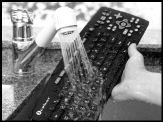If the Web is an online media horse race, leanness may be a winning advantage. For while fat and sassy video-on-demand is stumbling as it tries to gallop with its nose stuck in a feedbag of large video chunks, the slim dark horse of audio-on-demand is passing it—and has its eyes on the real world outside the racetrack.
This breed of audio-on-demand is more than clicking on a sound file, waiting for it to download, and listening raptly as your $2,000 desktop computer is instantly rendered a $20 desktop radio. At the starting gate are new products poised to turn digital audio-on-demand into a truly mobile audio technology delivered now via the Web and later by satellite.
This month, Audio Highway and Audible will separately release production versions of palm-sized digital audio devices. Each sells for less than $200, and each allows Web surfers to select audio programs from the companies’ Web sites, download them onto their PCs and—through a docking station—into the portable device for playback through a car stereo or headphones. Even the fashion-conscious exerciser might approve, since the players look more like fancy Walkmans than digital Dorkmans.
There are differences between the two. Audio Highway’s Listen Up Player holds one hour of digital audio; the Audible player, up to two hours (with less fidelity). Audio Highway’s audio programming is free (www.audiohighway.com), as long as you don’t mind six minutes of commercials per hour; Audible’s programs are pay-as-you-go (www.audible.com), with prices ranging from less than a buck to $20.
The key is the content, and both Audible and Audio Highway seem to have enough on their sites to strike the spoken-word aficionado mute: programs from broadcasters like National Public Radio, Newsweek On the Air, and the Associated Press (begging the question as to why no one has successfully marketed a time-shifting cassette recorder); audio books from sources such as Penguin, Harper, and Random House; plus lectures, speeches, and Web-only features you wouldn’t otherwise easily hear about. Audible, for example, tells me it’s been surprised by the popularity of unique $3-$5 business programs from the Economist Surveys and Harvard Business Review, presumably not as a soporific. And Audio Highway includes reference recordings on all sorts of topics, including some considered deadly dull, such as embalming.
As cool as this may sound, you’re still tied to the Web as an audio conduit. But that, too, may change. Another years-in-the-making technology—digital audio broadcast—is slowly coming to market. CD Radio (www.cdradio.com) received one of two national FCC licenses for digital satellite radio last October and expects to begin 50-channel satellite-to-car broadcasts in 1999. Its rival, American Mobile Radio, hopes to be broadcasting by 2000. Imagine combining the two technologies to rapidly download high-quality audio programs anywhere, at any time, without relying on a PC, Web connection, or incoherent DJ.
Audio-on-demand devices may be the sleeping giant of digital media applications, and finally give radio fans a new rejoinder to video bigots who swear radio is just TV without pictures. It could be that TV is radio without imagination—and portable, on-demand digital technology.
Psychic nerds network
Two common predictions for 1998 bubbled up at a dinner presentation last month by a panel of computer-industry editors: Expect to see a lot more of the US Department of Justice’s nose in the industry tent, and a lot less of diskless, terminal-like, and Microsoft-dislike network computers. During the sold-out Washington Software Alliance dinner, Michael Vizard of InfoWorld predicted NCs would “still be dead” in ’98, killed by the $1,000 personal computer, a sentiment largely echoed by some of the other panelists. The feds were variously predicted as a) investigating Intel, b) not breaking up Microsoft, or c) investigating Oracle because, as prognosticator Vizard reasoned, the company controls 90 percent to 95 percent of the Oracle database market, and besides, “You just can’t be anyone unless you’re investigated by the DOJ.”
Byte back
News about the increasing pace of Internet auctions (“Going, Going,” BM, 2/19) was a bit too frenzied. One reader pointed out that Onsale has instituted daily auctions, not the hourly ones of First Auction and Surplus Auction. I really should stop bidding while I’m writing.
Frank Catalano, a Seattle-area analyst for interactive multimedia and software companies, can be reached at catalano@catalanoconsulting.com.
Complete Byte Me archives are available at www.catalanoconsulting.com






